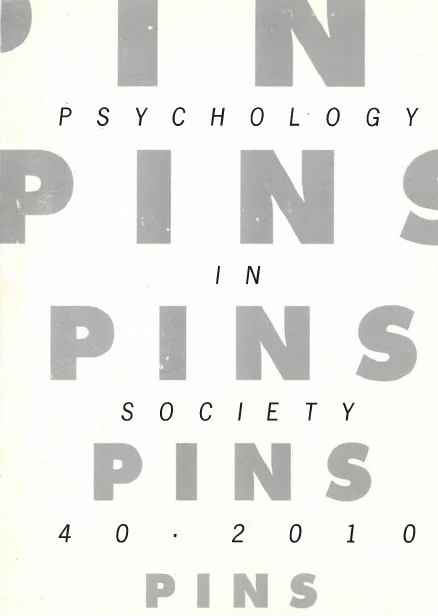CRITICAL PSYCHOLOGY FOR SOUTH AFRICAN TRANSFORMATION?
DOI:
https://doi.org/10.17159//2309-8708/2010/n40a10Abstract
Fox, D, Prilleltensky, I & Austin, S (eds) (2009) Critical psychology: An introduction (Second edition). London: Sage. ISBN 978-1-84787-173-2. Pages 470.
The launch of the Apartheid Archive Project fifteen years after the end of apartheid in South Africa is a fitting time to reconsider the role of psychology in the social and political history of the country. The book Critical psychology: An introduction provides an opportunity to revisit key critiques of the discipline of psychology, whilst perhaps more importantly for a South African audience, to consider their relevance across geographical and political contexts. The book draws together the ideas of a wide group of writers, many of whom have been central to the development of critical psychology internationally. As such, they reflect on debates and ideas that, over the past fifteen years, have shaped how psychologists have critiqued their discipline and, for South African psychologists, tackled post-apartheid social issues. There is no doubt that psychology was used in the service of apartheid ideology. However there have equally been pockets of resistance by psychologists who have attempted to critique, rethink and at times, abandon the discipline. This book provides the impetus to reflect on and reconsider the importance of these debates in the South African context. The editors of this book emphasize that they aim to create a community of critical psychologists and the breadth of the contributions already points to the success of this project. Written at a time when critical psychology is becoming a more commonly accepted topic in South Africa and a more easily adopted position for psychologists generally, this book summarizes some of the key debates that have resulted in the creation of critical psychology and the challenges a critical perspective poses to the existing assumptions underpinning the discipline. I will give a brief overview of the book before focusing on three main themes emphasized in the book that I think are of relevance for a South African audience, namely, the nature of the subject of psychology, the possibilities of psychological practice being a force for liberation, and what a more critically engaged alternative psychology might look like.
Downloads
Downloads
Published
How to Cite
Issue
Section
License
This journal is an open access journal, and the authors' and journal should be properly acknowledged, when works are cited.
Authors may use the publishers version for teaching purposes, in books, theses, dissertations, conferences and conference papers.
A copy of the authors’ publishers version may also be hosted on the following websites:
- Non-commercial personal homepage or blog.
- Institutional webpage.
- Authors Institutional Repository.
The following notice should accompany such a posting on the website: “This is an electronic version of an article published in PINS, Volume XXX, number XXX, pages XXX–XXX”, DOI. Authors should also supply a hyperlink to the original paper or indicate where the original paper (http://www.journals.ac.za/index.php/pins) may be found.
Authors publishers version, affiliated with the Stellenbosch University will be automatically deposited in the University’s’ Institutional Repository SUNScholar.
Articles as a whole, may not be re-published with another journal.
The copyright of the article(s) lies with the author(s).
The copyright of the journal lies with PINS-psychology in Society.
The following license applies:
Attribution CC BY-NC-ND 4.0 - https://creativecommons.org/licenses/by-nc-nd/4.0/

